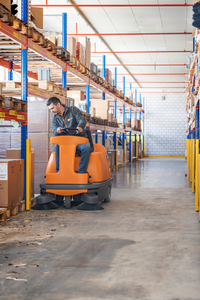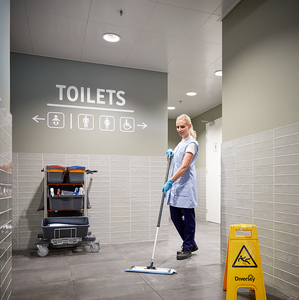

|
Edward Lowton
Editor |


|
| Home> | Premises management/maintenance | >Contract cleaning | >Reducing energy costs in premises cleaning |
Reducing energy costs in premises cleaning
22 December 2022
With businesses working to reduce CO2 emissions, there are a range of simple but effective ways to reduce energy consumption arising from premises cleaning, says Lynne Snoding

GOVERNMENT TARGETS to reduce CO2 emissions as part of the wider commitment to zero carbon by 2050 have focused attention on energy consumption across all parts of society.
Meeting these targets on time represents a significant challenge but the sudden and unforeseen rise in energy prices this year means that businesses have an immediate need to reduce their consumption. Many cleaning tasks require energy, including heating water; running electrical equipment and appliances; lighting and heating areas when cleaning is undertaken. There are some simple but effective ways to reduce energy consumption across these and other areas.
The right tools for the job
The first is to check that tasks are completed with the right processes, products, and equipment. This will help to ensure optimum efficiency and reduce the need for repeat cleaning which avoids additional water heating and electrical equipment running costs let alone savings in time and product consumption.
It is also good practice to ensure equipment is maintained correctly to ensure reliable and energy-efficient performance. This might include, for example, making sure pumps and filters in equipment are checked and cleaned regularly to remove blockages that cause inefficiency. Equipment used in hard water areas can be prone to lime-scale.
This can accumulate and restrict the passage of water and impact on the equipment’s reliability and limit the efficiency of the heating element. More energy will be required to heat the same amount of water. Regular descaling with a specialist product or switching to formulations that prevent lime-scale will help prevent this issue.
Switching to lower temperature products
Another simple way to reduce energy costs is to switch to products that are effective at lower temperatures. It will cost roughly half as much to heat water from tap or room temperature to 40oC as it does to heat it to 60oC.
Alternative low temperature formulations are available for tasks such as general cleaning, floorcare, and laundry (including disinfection) and will deliver payback from day one. Many can be swapped into existing processes with minimal retraining or significant change. Diversey's Diveasy system, for example, uses cold water to remove carbon deposits from kitchen equipment.
Modern floorcare machines such as scrubber driers, sweepers, and vacuum cleaners are generally much more energy efficient than previous-generation models.
Better design and innovations such as digital motors, energy-efficient batteries and chargers, and control systems that proactively optimise electrical, water, and product consumption all help to make the most of available energy. Features like these quickly deliver savings on running costs. The latest generation TASKI ULTIMAXX scrubber driers, for example, has increased battery efficiency and autonomy by 30 per cent over previous models.
The benefits of daytime cleaning
Traditional cleaning is often completed when there are fewer people present, such as overnight or at weekends. This might be convenient but usually requires the building’s lighting and heating to remain on. Cleaning more when the building is in use can reduce or eliminate many of these extra costs.
This so-called daytime cleaning is possible because modern equipment is often more compact, quieter, and less obtrusive than in the past. Cleaning product ranges also include formulations which can be used more safely when people are present.
Many of these changes can be implemented quickly and easily with little or no additional upfront investment. When more significant change is identified it becomes much easier justify an investment as energy prices rise because savings offset the costs much more quickly
Lynne Snoding is BSC sector marketing manager at Diversey UK and Ireland
For more information:
Tel: 01604 405311
- Driving forward with new ride-on scrubber drier
- Concentrates for all applications
- Diversey upgrades robotic cleaning with new floorcare machine
- Single cleaning partner
- Large area cleaning
- Driving productivity forwards
- Enhancing staff and customer perceptions with washroom solutions
- The quest for greener cleaning
- Compact scrubber drier
- Floorcare for industrial premises



















